Reviews
Aske Dørge@aske
Sarah Sammis@pussreboots
Colleen@mirificmoxie
Gavin@gl
Bouke van der Bijl@bouk
Jeff James@unsquare
Todd Luallen@tluallen
Adam@adam
Arun Raghavan@arun
Jason @jmp
Ben Nathan@benreadssff
Adam@adam
Paul J Robinson@pjrobinson
Ricardo@myrddinmorfrenwyllt
Daniel Bower@danielbower
Brian Gillis@gillicuddy
Gigi V@barksandvino
Darren Olivier@darreno
Aidan Dysart@aidaan
Lovro Oreskovic@lovro
John Manoogian III@jm3
Pierre@pst
Micah@mchmcf
Jeff Borton@loakkar
Highlights
Edward Steel@eddsteel
Edward Steel@eddsteel
Edward Steel@eddsteel
Edward Steel@eddsteel
